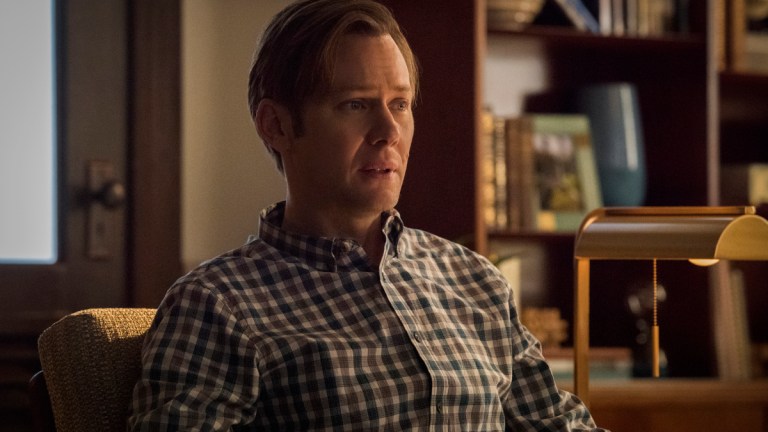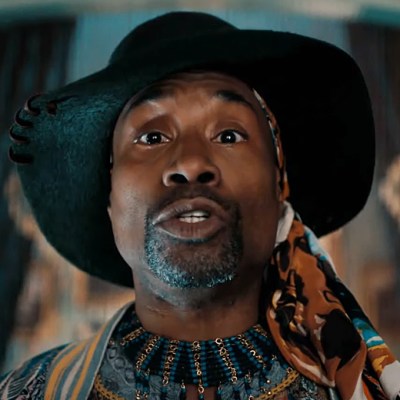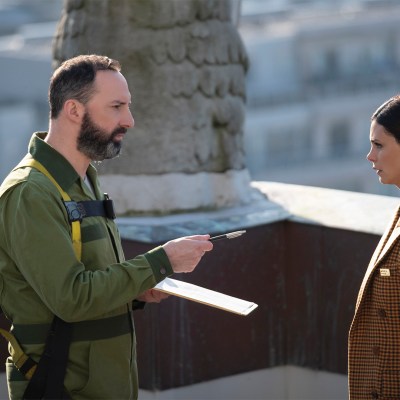The Twilight Zone: Jimmi Simpson On Listening to the Voice in His Head
The Twilight Zone’s Jimmi Simpson talks to us about his sci-fi legacy in shows like Westworld, Black Mirror, and hopefully one day even Star Trek.

The following contains spoilers for The Twilight Zone season 2 episode 1.
The first episode in The Twilight Zone season 2 feels right at home with the classic installments from the original black-and-white series. A frustrated guy named Phil (Jimmi Simpson) falls in love with a voice in his head. He’s not crazy, it is a real person, and through the accidental miracle of telepathy, a woman named Annie (Gillian Jacobs) seems to fall for him, too. Because this telepathic meet-cute happens in The Twilight Zone, you know this probably isn’t going to end well.
Bringing his usual cocktail of kind jumpiness and quirky charm, Jimmi Simpson presents an utterly realistic version of how a person like this would actually react in this situation. If you love Simpson for his roles in It’s Always Sunny In Philadelphia or Westworld, you’ll find something familiar here. But, the character of Phil is more than just a down-on-his-luck guy who happens to suddenly gain telepathy. The episode is more layered and smarter than a spooky version of You’ve Got (Brain) Mail. The writing from Sara Amini and Emily C. Chang is part of what gives this episode it’s zing, but Simpson’s singular performance is what gives the last-minute-twist-ending a lasting impression.
We were unable to get a telepathic conversation working with Jimmi Simpson, so we settled for a phone call instead. Here’s what he told us about his trip to The Twilight Zone.
DEN OF GEEK: How is The Twilight Zone different from your other big sci-fi projects like Black Mirror or Westworld?
JIMMI SIMPSON: Westworld is a juggernaut of everything you could imagine that has to work together — the production value is an entire experience. Such magnitude. Black Mirror is also high-level, but it’s also like, Charlie Brooker — you’re living in his brain. That’s the experience. It comes down to the creators. With Westworld, you’re living in Jonah [Nolan] and Lisa [Joy’s] brains and their brains are very cinematic and epic. And Charlie’s brain is very specific and familiar, which is why it’s so terrifying. With Twilight Zone, it’s all of that, but you have this history. You have three beautiful iterations of the series. Rod Serling starting this crusade 50 years before either Black Mirror or Westworld existed. For me personally, it’s part of my DNA. I’ve always gravitated toward all The Twilight Zone series, whether it was the original, the ‘80s, or now, with Jordan [Peele’s]. It’s a shock of recognition. And now, I got to be sent out on my own experience.
So, each one — Westworld, Black Mirror, and Twilight Zone — is equally satisfying. But, Twilight Zone, I have the longest history with.
In your episode, “Meet In the Middle,” this felt like we got a new take on the telepathy story. Can you talk about that?
YES! I think I tweeted something like that two days ago, that this takes the ESP story to a whole new level. I think that’s the case. That’s why I hopped-on so quickly. I would love to be part of the legend of ESP storytelling. To me, “Meet In the Middle,” takes it to a place I haven’t seen. I think the execution was what mattered.
The cool thing is that what happens with The Twilight Zone is your mind is saying “This ride’s so fun. This ride’s fun, and then, of course, you’ve got to cap it up.” This one really sticks the landing. Which is really hard for a short sci-fi anthology to do.
Is Phil really the victim? Is he a good guy? Or not?
Well, nothing is evil or good, right? I’ll start with talking about the character of Annie. I think Gillian Jacobs knocked it out of the park as she does with pretty much everything she touches. But yeah, Annie pushed Phil to do this thing. But, it’s not like she was born evil. She was beaten, she was abused, and taken advantage of by the man in her life. She uses Phil as the tool of her escape, to get this to happen. Sarah and Emily, the two writers, did an amazing job penning this story. And I think they wrote those amazing layers of a man. Phil wasn’t evil either. But he was neglectful. He was petty. He was childish. He was demanding. He met the women he met to standards he didn’t hold himself to. Sara [Amini] and Emily [Chang] wrote so that was there.
Later, the director, Mathias [Herndl], I suggested that when she hangs up on him, he screams “bitch!” Just show that this guy has that in him. That it’s not just that she creates this. He has this energy in him. He has the ability to lose control. I think things like that help to show that he’s not some kind of hapless victim at all. He’s on his own journey.
No matter who I’m playing, if you’re playing a guy, you’re looking for the humanity. Phil is charming, but a lot of guys are charming when it gets down to brass tacks. To see his little want to be taken away, and that he overreacts with that, it’s a nice marker of where he’s at.
Half of the dialogue in this episode happens as voice-over, because of the telepathy. How did you and Gillian Jacobs approach that? How important was the recording process to the development of the story?
It was so, so, so important. Mathias and I talked about it for a long time. How are we going to do it? Are we going to have a recording of Annie, but that didn’t seem to make sense. Sometimes we had a wonderful woman to help with her lines. And sometimes it just made the most sense for me to memorize the entire scene. A lot of times it was just better to run it in my head, and then say Phil’s lines and react to my imagination of what was being said. Which is the actual possibility of what is happening in the story. But, when we went back to flesh-it-out, Gillian and I did a jump-track in the same room. And I was terrible. I hadn’t worked out a lot of stuff yet. A month later, after I knew where I was in all those scenes, we did it again and laid it down the track again, with Gillian and I together in the room for like eight hours. Never like line-by-line, but whole scenes. And I think that was essential. Because that connection came from us looking at each other despite the fact that in the story we’re hundreds of miles apart.
This episode had a real classic Twilight Zone twist. What is your favorite all-time Twilight Zone twist?
Favorite twist ever. That’s hard. But, I don’t think you can really top the twist of “Eye of the Beholder.” Even if you’ve seen it and you know what is happening. I’ve seen it, what, fifty times? I mean, you can enjoy the story knowing the twist, it’s so beautiful built around that reveal. I don’t see how you can top “Eye of the Beholder.” Humans are so used to this standard, and we’re just going to gloom-on to what we think they are talking about; what beauty is. It’s such a great commentary on the human condition.
I think “Meet in the Middle” could be a solid number 2. When the audience realizes what Phil has gotten himself into before Phil does, and I think that is an amazing Twilight Zone twist.
Now that you’ve done all these big sci-fi shows, you have to do Star Trek next, right?
I’ve been fantasizing about that since Next Generation, so yes.
Could you do young Kirk?
I come on, I don’t have those looks! But what about a young Bones? I would be a great young Bones. Am I younger than Bones anymore? I could bring back the Tribbles don’t you think? I could be some weird guy who saved the Tribbles and now, is going to unleash all over again.
The Twilight Zone Season 2 is streaming now on CBS All Access.


